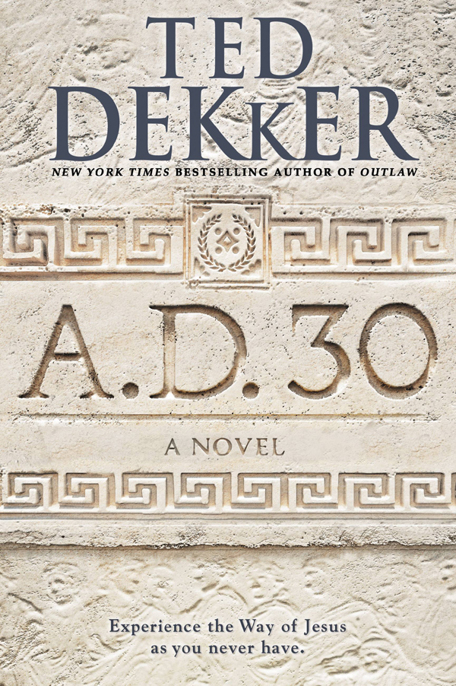
A.D. 30
A.D. Series, Book 1
کتاب های مرتبط
- اطلاعات
- نقد و بررسی
- دیدگاه کاربران
نقد و بررسی

September 8, 2014
The reigning king of Christian thrillers expands into biblical fiction to explore the time and teachings of Christ. Maviah, the illegitimate daughter of a Bedouin king, is sent to Egypt and enslaved. When she has a baby with a man her
mistress loves, she is returned to her
family in double shame. Raiding enemies kill Maviah’s son and capture her father, so she journeys to seek an audience with King Herod in the hopes that he will avenge her son and rescue her father. Traveling with two of her father’s male slaves, she crosses paths with another man, Yeshua, who has a more profound impact on their actions than Herod ever could. Maviah’s viewpoint is used to narrate the action, including her meetings with Yeshua and long conversations that weave Christ’s gospel teachings into the story in clever ways. The author paints vivid scenes of desert crossings on camels, aristocratic life in ancient Palestine, and the private doings of kings and queens.
In this first of a pair of novels about Jesus, Dekker kicks down the door of biblical fiction. Agency: Creative Trust.

September 15, 2014
Dekker (Outlaw, 2013, etc.) makes the spiritual real through the fictional Maviah, daughter of Rami bin Malik, Bedu sheikh. It's A.D. 30. Maviah has returned from Egypt into her father's reluctant care. She was born illegitimate, her father's daughter by a woman from an outcast Bedu tribe; thus, her exile. Now she's been returned from Egypt because she's given birth to a baby son "without a suitable husband." Her father is the Banu Kalb's great sheikh, but contrary to nomadic traditions, he settled at Dumah in the Northern Arabian desert, allying with his wife's uncle, Nabataean King Aretas. Now Nashquya, Malik's wife, dies, her death robbing Maviah of protection and jeopardizing Malik's power. Aretas gives his support to the Thamud, an aggressive Kalb enemy. Worse, Malik is betrayed by Maliku, his son. As Malik's overthrown, he dispatches Maviah to Palestine. She's to convince King Herod to persuade Rome to support the Kalb. Dekker plunges headfirst into this complex scene-setting, thereafter ramping up drama with Maviah's perilous trek across the desolate Nafud desert. Dekker's descriptions of the Nafud's dangers-think Lawrence of Arabia-are powerfully done, as are his portrayals of the perils posed by the clashing customs of Arabs, Jews and Romans in an era when women were property. Dekker's secondary characters sparkle as well, including the Bedu Judah, a convert to Judaism who's entranced with Yeshua of Nazareth. A nicely scripted romance develops between Judah and Maviah-"Judah was like water to my heart"-but as Maviah seeks Herod at Sepphoris, she worries she's "too common to win the favor of a king." Then she meets Yeshua-"I could not doubt I was looking at more than a mere man." What follows are machinations at Herod's court and then pain, imprisonment and swordplay at Aretas' Petra court, before Dekker offers an ending supporting his announced sequel. Action-adventure, set against the life of Yeshua, the prophet who dared speak against "the way of the world, protected by position and sword and gold and knowledge."
COPYRIGHT(2014) Kirkus Reviews, ALL RIGHTS RESERVED.

Starred review from November 15, 2014
Maviah is the shunned daughter of Rami, a powerful Bedouin sheikh in Arabia. Only through the kindness of her stepmother, Nasha, is Maviah allowed to return home with her illegitimate son. When Nasha dies, Maviah's very existence is in danger when Nasha's father attacks Rami, seeking to conquer his kingdom. In a desperate attempt to save his realm, Rami asks Maviah to go to King Herod and beg for an alliance. But on her journey she meets a Yeshua, a teacher whose theology runs counter to the current thinking of the time and whose reputation as a powerful mystic begins to attract the notice of the ruling powers. This unusual man may be the only solution to her problems. VERDICT This first entry in a new series about the life of Yeshua (Jesus Christ) showcases the New York Times best-selling author's gift ("Circle" series) for immersing readers in ancient settings, believable characters, and high-octane story lines. An accessible and suspenseful tale reminiscent of novels by Tosca Lee and Anita Diamant, this is biblical fiction of the highest caliber.
Copyright 2014 Library Journal, LLC Used with permission.

October 15, 2014
The title gives readers an idea of the story's parameters, but while there are many novels about the life of Jesus, this one adds a strong woman's story to the mix. Maviah, the illegitimate daughter of a powerful bedouin sheik, has not had an easy life, starting with rejection by her father. But when his kingdom is conquered, he entrusts her with a mission: travel to Israel, present herself to Herod, and secure his military support. Maviah is accompanied by Saba, a strong, silent African, and Judah, a bedouin Jew who seeks the mystic Yeshua and whom Maviah comes to love. This is the kind of book that the term sweeping epic was made for. The tribulations of crossing a desert, the palace intrigues, the brutalities Maviah enduresall have a larger-than-life quality. Dekker's descriptive abilities set his panoramic stage well, and the choices his characters make are not always foreseen. The presence of Yeshua, changing the lives of those who respond to his message, adds to what is already a thrilling yet thoughtful read (though the emphasis on Jewish purity laws unfairly simplifies that religion). The ending's ambiguities will have readers anxious for the sequel.(Reprinted with permission of Booklist, copyright 2014, American Library Association.)

























دیدگاه کاربران